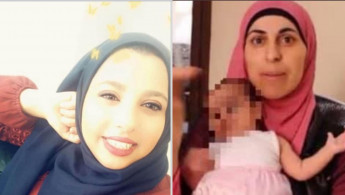Palestinian bride-to-be's murder reignites campaign against domestic violence
The alleged murder of 24-year-old Rozan Nasser at the hands of her fiance has sparked calls for justice against domestic abusers in the Palestinian territories.
3 min read
Rozan Nasser (L) and Wafa Masarwe (R) were murdered this month [Getty]
Ahmed Abu Kwaik's confession to murdering his fiancee Rozan Nasser near Ramallah in the West Bank has reignited a campaign in the Palestinian territories against gender-based violence.
Abu Kwaik admitted to strangling 24-year-old Nasser to death following his arrest in the town of Hazma, where he had fled and attempted to hide, on Wednesday, according to a police spokesperson.
Police spokesman Louis Arizikat told the media that Abu Kwaik had confessed to strangling his fiancee in the car on their way to go clothes shopping ahead of Eid. He left Nasser's body in the car and fled to Jerusalem, and then Hazma, changing his clothes in order to evade arrest.
Abu Kweik has been referred to the Public Prosecution for a full investigation, trial and sentencing, Arizikat said.
Social media was flooded with tributes to Nasser, with some users re-posting the bride-to-be's affectionate photos and message exchanges with her fiance in order to point out the complex nature of domestic violence.
Nasser's name also trended on Twitter, with many calling for action against domestic violence.
"Every day a new name, every day a new victim, every day silence, disappointment and oppression," tweeted one user.
Social media users also brought up the case of Wafa Masarwa, whose husband was indicted by the public prosecution on Thursday, charged with her murder. He is alleged to have stabbed her to death in their home in Taibeh in front of their young daughter, before attempting to cover up the crime by disposing of the weapon and his clothes.
Social media users also likened Nasser's murder to that of a Jordanian woman named Ahlam, who was beaten to death by her father last week, which sparked street protests in Amman.
Others brought up the killing of 21-year-old Israa Ghrayeb, who died after allegedly being beaten and tortured by her brother after she posted a video on social media with a man who she was soon to be engaged to.
Ghrayeb's murder sparked a mass anti-femicide movement among Palestinian women across the globe, who took to the streets to demonstrate.
Activists say the outdated legal system does little to prevent these crimes.
Abu Kwaik admitted to strangling 24-year-old Nasser to death following his arrest in the town of Hazma, where he had fled and attempted to hide, on Wednesday, according to a police spokesperson.
Police spokesman Louis Arizikat told the media that Abu Kwaik had confessed to strangling his fiancee in the car on their way to go clothes shopping ahead of Eid. He left Nasser's body in the car and fled to Jerusalem, and then Hazma, changing his clothes in order to evade arrest.
Abu Kweik has been referred to the Public Prosecution for a full investigation, trial and sentencing, Arizikat said.
Social media was flooded with tributes to Nasser, with some users re-posting the bride-to-be's affectionate photos and message exchanges with her fiance in order to point out the complex nature of domestic violence.
Twitter Post
|
Nasser's name also trended on Twitter, with many calling for action against domestic violence.
"Every day a new name, every day a new victim, every day silence, disappointment and oppression," tweeted one user.
Social media users also brought up the case of Wafa Masarwa, whose husband was indicted by the public prosecution on Thursday, charged with her murder. He is alleged to have stabbed her to death in their home in Taibeh in front of their young daughter, before attempting to cover up the crime by disposing of the weapon and his clothes.
Social media users also likened Nasser's murder to that of a Jordanian woman named Ahlam, who was beaten to death by her father last week, which sparked street protests in Amman.
Others brought up the killing of 21-year-old Israa Ghrayeb, who died after allegedly being beaten and tortured by her brother after she posted a video on social media with a man who she was soon to be engaged to.
Ghrayeb's murder sparked a mass anti-femicide movement among Palestinian women across the globe, who took to the streets to demonstrate.
Activists say the outdated legal system does little to prevent these crimes.
Speaking to The New Arab following Ghrayeb's death in 2019, Palestinian feminist blogger Fadumo Adan said: "We live in a world where honour killing happens every single day. We experience scrutiny, close monitoring and violation of privacy and boundaries. Muslim women are now gaining control over their financial, economic, legal and reproductive decision-making power."
"Honour killings will never be justifiable. We shouldn't have to mitigate the risk of honour killings by limiting our own person freedom, autonomy and self-determination," she added.
Follow us on Facebook, Twitter and Instagram to stay connected





 Follow the Middle East's top stories in English at The New Arab on Google News
Follow the Middle East's top stories in English at The New Arab on Google News
![Netanyahu furiously denounced the ICC [Getty]](/sites/default/files/styles/image_330x185/public/2024-11/GettyImages-2169352575.jpg?h=199d8c1f&itok=-vRiruf5)
![Both Hamas and the Palestinian Authority welcomed the ICC arrest warrants [Getty]](/sites/default/files/styles/image_330x185/public/2024-11/GettyImages-2178351173.jpg?h=199d8c1f&itok=TV858iVg)
